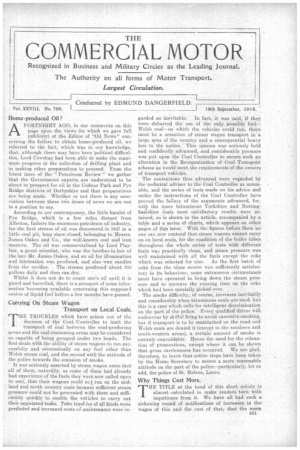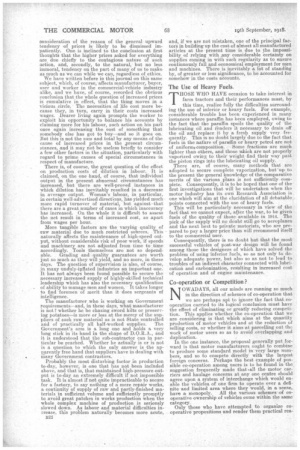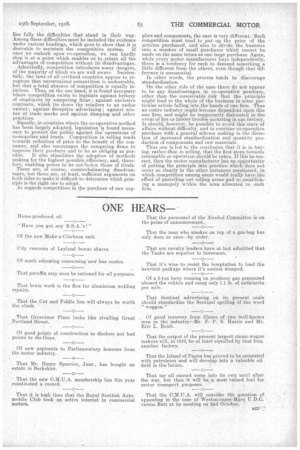Home-produced Oil?
Page 1

Page 2

Page 3

If you've noticed an error in this article please click here to report it so we can fix it.
AFORTNIGHT AGO, in our comments on this page upon the views (to which we gave full publicity) of the Editor of "Oil News" concerning the failure to obtain home-produced oil, we referred to the fact, which was in our knowledge, that, although there may have been political difficulties; Lord Cow-dray had been able to make the maximum progress in the collection of drilling plant and in making other preparationa to proceed. From the latest issue of the "Petroleum Review" we gather that the Government experts are understood to be about to prospect for oil in the Codnor Park and Pye Bridge districts of Derbyshire and that preparations are being made. Whether or not there is any association between these two items of news we are not in a position to say.
According to our contemporary, the little hamlet of Pye Bridge, which is a few miles distant from Alfreton, fathers the enormous petroleum oil industry, for the first stream of oil was discovered in 1847 in a little coal pit, long since closed, belonging to Messrs. James Oakes and Co., the well-known coal and iron masters. The oil was commercialized by Lord Playfair, a great scientist, who was the brother-in-lair of the late Mr. James Oakes, and an oil for illumination and lubrication was produced, and also wax candles from the residue_ The stream produced' about 300 gallons daily and then ran dry.
Whilst it does not do to count one's oil until it is piped and barrelled, there is a prospect of 'sortie information -becoming available concerning this supposed source of liquid fuel before a few months have passed.
Carrying On Steam Wagon Transport on Local Coals. THE TROUBLES which have arisen out of the decision of the Coal. Controller to limit the transport of coal between the coal-producing areas and the coal-consuming areas may-be considered as capable of being grouped under two heads. The first deals with the ability of steam wagons to run successfully and economically on any fuel other thin Welsh steam coal, and the second with the attitude of the police towards the emission of smoke.
. It was seriously asserted by steam wagon users (not all of them, naturftlly, as some of them. had already had experience of the fuels they were now called upon to use), that their wagons could nc ts; run on the midland and north country coals because sufficient steam pressure could not be generated with them and suffiCiently quickly to enable the veficles to carry out their appointed tasks. Tube trout-ies of all kinds were predicted and increased costs of maintenance were re garcled as inevitable. In fact, it was said, if they were debarred the use of the only .possible' fuel— Welsh coal—on which the vehicles could run, there must be a cessation of steam wagon transportin a large area of the country and a consequential heavy loss to the nation. This ()Pinion was seriously held and confidently advanced, and considerable pressure was put upon the Coal Controller to secure such in alteration in the Reorganization of Coal Transport scheme as would meet the requirements of the owners of transport vehicles.
The contentions thus advanced were regarded by the technical adviser to the Coal Controller as untenable, and the series of teats made on his advice and under the instructions of the Coal Controller have proved the fallacy of the arguments advanced, for, with the more bituminous Yorkshire and Nottinghanishire Coals most satisfactory results were at tamed, as is shown in the article, accompanied by a table and a series of charts, which appears on other pages of this issue. With the figures before them no one can now contend that steam wagons cannot carry. on on local coals, fcir the condition of the boiler tubes throughout the whole aeries of tests with different fuels was practically clean, and steam pressure was well maintained with all the fuels except the coke which was selected for size. As the first batch of coke from the same source was sufficiently satisfactory in its behaviour, some extraneous circumstance must have operated to bring down the steam pressure and to increase the running time on the coke which had been specially picked over.
The smoke difficulty, of course, increases inevitably and considerably when bituminous coals are used, but thiq is a case which calls for intelligent discrimination on the part of the police: Every qualified driver will endeavour by skilful firing to avoid excessive smoking, but if transport is to be maintained on the road and Welsh coals are denied it (except in the southern and south-western areas), a certain amount of smoke is entirely unavoidable. Hence the need for the relaxation of prosecutions, except where it can be shown that gross carelessness has occurred. We are glad, therefore, to learn that active steps have been taken by the Home Secretary to secure a more reasonable attitude on the part of the police—particularly, let us add, the police of St. Helens, Lancs.
Why Things Cost More.
HE TITLE at the head of this short article 'is almost calculated to make readers turn with impatience from it. We have all had such a sickening round of notifications of increases. in the wages of this and the cost of that, that the mere
consideration of the reason of the general upward tendency of prices is likely to be dismissed impatiently. One is inclined to the conclusion at first thoughts that the higher prices asked for everything are due chiefly to the contagious nature of such action, mad, secondly, to the natural, but no less immoral, tendency on the part of many of us to make as much as we can while we can, regardless of ethics. We have written before in this journal on this same subject, which, of course, affects manufacturer, buyer, user and worker in the commercial-vehicle industry alike, and we have, of course, recorded the obvious conclusion that the whole question of increased prices is cumulative in effect, that the thing moves in a vicious circle. " The necessities of life cost more because they, in turn, carry in their costs increased wages. Dearer living again prompts the worker to exploit his opportunity to 'balance his accounts by claiming more for his labour, such action on his part once again increasing thecost of something that somebody else has got to buy—and so it goes on. But this is not the sum and total by any means of the cause of increased prices in the present circumstances, and it may riot be useless briefly to consider a few other factors in the situation, particularly with regard to prime causes of special circumstances in respect of manufacture.
There is, of course, the great question of the effect on production costs of dilution in labour. It is claimed, on the one hand, of course, that individual output in the present abnormal circumstances has increased, but there are well-proved instances in -Which dilution has inevitably resulted in a decrease in average output. Woman's labour, in particular, in certain well-advertised directions, has yielded much more rapid turnover of material, but against that there are a great number of cases in which inaccuracy has increased. On the whole it is difficult to assess the net result in terms of increased cost, as apart from wages per hour.
More tangible factors are the varying quality of raw material due to much restricted sonrces. This naturally affects the maintenance of high-speed output, without considerable risk of poor work, if speeds and machinery are not adjusted from time to ,time accordingly. Tools themselves are not so dependable. Grading and quality guarantees are worth just so much as they will yield, and no more, in these days. The question of supervision is also, of course, in many unduly-inflated industries an important one. It has not always been found possible to secure the necessary increased supply of highly-skilled technical leadership which has also the necessary qualification of ability to manage men and women. It takes longer to find foremen of merit than it does sergeants of intelligence.
The manufacturer who is working on Government requirements—and, in these days, what manufacturer is not ? whether he be chasing sword hilts or preserving potatoes—is more or less at the mercy of the suppliers of such raw material as is not State controlled
and of practically all half-worked supplies. The Government's arm is a long one and holds a very long stick in its hand in the shape of D.O.R.A., and it is understood that the sub-contractor can in particular be reached. Whether he actually is or is not is a question to which the only answer is the apparently free hand that suppliers have in dealing with many Government contractors.
Probably the most disturbing factor in production to-day, however, is one that has not been included above, and that is, that maintained high-pressure output is to-day an extremely. difficult if not impossible task. It is almost if not quite impracticable to secure for a factory, to say nothing of a mere repair works, a continuity of supply of raw and partly-finished materials in sufficient volume and sufficiently promptly to avoid great patches in works production when the whole complex machine of production is seriously slowed down. As labour and material difficulties increase, this problem naturally becomes more acute,
B22
and, if we are not mistaken, one of the principal factors in building up the cost of almost all manufactured articles at the present time is due to the impossibility of relying with any considerable certainty on supplies coming in with such regularity as to ensure continuously full and economical employment for men and machines. There is inevitably a lot of standing by, of greater or less significance, to be accounted for somehow in the costs accounts.
The Use of Heavy Fuels.
HOSE WHO HAVE occasion to take interest in farm tractors and their performances must, by
this time, realize fully the difficulties surrounding the use of inferior or heavy fuels. For example, considerable trouble has been experienced in many instances where paraffin has been employed, owing to the fact that the paraffin spoils the quality of the lubricating oil and lenders it necessary to drain off the oil and replace it by a fresh supply very frequently. This is no doubt largely due to the fact that fuels in the nature of paraffin or heavy petrol are not of uniform). composition. Some fractions are much lighter than others, and those which are not properly vaporized owing to their weight find their way past the piston rings into the lubricating oil supply. There are, of course, many methods that are adopted to secure complete vaporization, but-up to the present the general knowledge of the comparative merits of the various plans is not sufficiently complete. Consequently, it is to be hoped that one of the first investigations that will be undertaken when the motor industry has its own Research Association is one which will aim at the elucidation of all debatable, points connected with the use of heavy fuels.
This will be particularly necessary in view of the fact that we cannot expect, after the war, to be given fuels of the quality of those available in 1914. The pick of the supply will no doubt still go to aeroplanes and the next best to private motorists, who are prepared to pay a larger price than will recommend itself to the commercial user.
Consequently, there is no doubt but that the most successful vehicles of post-war design will be found among those the designers of which have solved the problem of using inferior fuels, so as not only to develop adequate power, but also so as not to lead to troubles of an indirect character connected with lubrication and carbonization, resulting in increased cost of operation and of engine maintenance.
Co-operation or Competition ?
NOWADAYS, all our minds are running so much in the direction of schemes of co-operation that we are perhaps apt to ignore the fact that cooperation carried to its logical conclusion must have the effect of eliminating or greatly reducing competition. This applies whether the co-operation that we are considering is that which aims at the quantity production of motor vehicles and at the reduction of selling costs, or whether it aims at parcelling out the work of motor users so as to avoid overlapping and
duplication. , In the one instance, the proposal generally put forward is that motor manufacturers ought to combine to produce some standard model in very large numbers, and so to compete directly with the largest foreign concerns. Perhaps the best example of possible co-operation among users is to be found in the suggestion frequently made that .all the motov carriers and haulage concerns at any one centre should agree upon a system of interchange which would enable the vehicles of one firm to operate over a, definite and limited area where they would, in a sense, have a monopoly. All the various schemes of cooperative ownership of vehicles come within the same category. Only those who have attempted to organize cooperative propositions and render them practical rea lize fully the difficulties that stand in their way. Among these difficulties must be included the evidence under various headings, which goes to show that it is desirable to maintain the competitive system. If once we embark upon eo-operation, we can hardly stop it at a point which enables us to retain all the advantages of competition without its disadvantages. Admittedly, competition introduces many dangers, of the majority of which we are well aware. Incidentally, the laws of all civilized countries appear to recognize that unrestrained competition is undesirable, but that a total absence of competition is equally injurious. Thus, on the one hand, it is found necepsary where competition exists to legislate against bribery of employees by competing firms ; against exclusive contracts, which tie down the retailers to an undue extent ; against deceptive advertising ; against misuse of trade marks and against dumping and other practices.
Equally, in countries where the co-operative method has been largely adopted, legislation is found necessary to protect the public against the operations of monopolies and trusts. Competition in selling tends towards reduction of price to the benefit of the consumer, and also encourages the competing firms to improve their products and to be as obliging as possible. It also stimulates the adoption of methods making for the highest possible efficiency, and, therefore, enabling prices to be cut 'below those of rivals. There are, of course, counterbalancing disadvantages, but there are, at least, sufficient arguments on both sides to make it difficult to determine which principle is the right one to adopt.
As regards competition in the purchase of raw sup plies and components, the case is very different. Such competition must tend to put up the price of the articles purchased, and also to divide the business into a number of small purchases which cannot be made on the same terms as one large purchase. Again, while every motor manufacturer buys independently, there is a tendency for each to demand something a, little different from the others, even though that difference is unessential.
In other words, the process -Wads to discourage standardization.
On the other side of the case there do not appear to be any disadvantages in co-operative purchase, other than the conceivable risk that the principle might lead to the whole of the business in some_particular article falling into the hands of one firm. Thus an entire industry might become dependent upon this one firm, and might be teniporarily. dislocated in the event of fire or labour trouble occurring in one factory. It should, however, be possible to avoid this state of affairs without difficulty, and to combine-co-operative purchase with a general scheme making in the direction of increased starklardization and quantity production of components and raw materials.
Thus one is led to the conclusion that it is in buying, rather than in selling, that the first steps towards reasonable co operation should be taken. If this be correct, then the motor manufacturer has an opportunity of putting the principle into practice which does not occur so clearly in the other instances mentioned, in which competition among users would really have the effect of pareelling out selling areas and so establishing a monopoly within the area allocated to each firm.






















